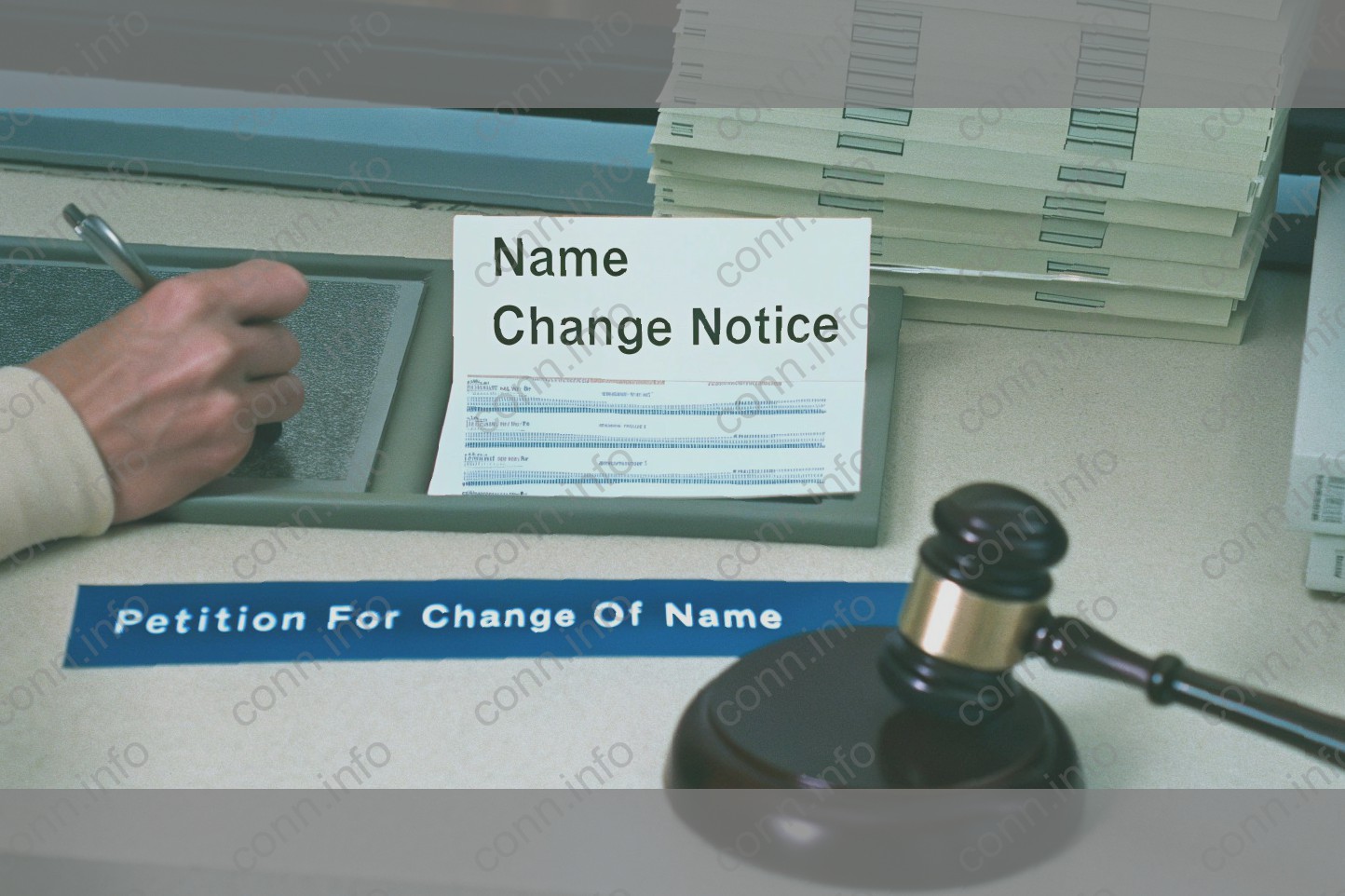Illinois Name Change Laws
When embarking on a name change process, it is essential to comprehend the relevant laws and regulations that impact the endeavor. In Illinois, the legal framework governing name changes is outlined in the Illinois Compiled Statutes, specifically 735 ILCS 5/21-101 to 21-106. This code establishes the protocol and requirements for individuals seeking to legally change their name, whether they are changing their first name, last name, or both.
Before filing a name change petition in Illinois, it is important to make sure that the new name is not "foreign" in nature. For example, a person cannot even go through the process of changing his or her name to "Shaquille O’Neal." Even though that may be a common name of someone who has a lot of money and is very famous, it is not considered a "name of common usage" which would be allowed. Forming a specific or unique name is a name change that would likely be allowed in Illinois, as long as it is not considered "foreign" in nature (i.e. the form of a last name followed by an apostrophe) .
It’s also worth noting that name changes in Illinois typically require notice to interested parties. This means that the court must inform certain individuals or organizations of the proposed name change, such as creditors, employers, and potential future impactees, including an ex-spouse. Failure to provide notice can result in the denial of the name change application.
In addition to these general considerations, there are additional regulations specific to minors. Any name changes of minors requires the consent of both parents (or one parent and proof of missing/absent of the other parent). Surnames of children will not normally be changed unless both parents are in agreement on the change. If the child is between the ages of 14 and 19, they may be required to consent to the change themselves.
As with any legal matter, understanding the laws and requirements is crucial to successfully completing the name change process. Familiarizing yourself with the legal framework before initiating the process is key to avoiding complications down the line.
Eligibility Requirements
An application for a name change may be filed at any age, however, the applicant must be an adult by the time of the final event known as "hearing". A minor child can have his or her name changed in Illinois only if his or her parent or legal guardian files an application for a name change on their behalf. No matter your age, you must file the petition for name change with the Circuit Court.
To state the obvious, before you can legally ask the court to grant your request for a name change you need to have had a legal name to begin with. An adult has a legal name from birth or otherwise as a result of a marriage. Children under the age of 18 also have a legal name, but when they attain the age of majority it is automatically changed to whatever their birth record or subsequent legal name might be.
The actual petition to change your name can’t be filed unless you have lived in Illinois for at least six months. In addition, you must reside in the county where you are submitting your name change application.
Preparing the Forms
When it comes to legally changing your name in Illinois, preparing the necessary documents is an essential first step in the process. Before you can formally petition the court for a name change, you must gather the required documentation and fill out all relevant forms that establish residency and validity of the proposed new name. Certain forms are critical to the name change process, particularly: Petition for Change of Name: The Petition for Change of Name formally declares your intent to change your name and requests the court’s approval to do so. In Illinois, this petition and the requisite information such as your current name, proposed name to be adopted, date of birth, date of residency, and the reason for the name change must be filed in the Circuit Court of the county where you reside. This petition must be verified by you, indicating that the information contained within is true and correct to the best of your knowledge. If the information provided in the petition is incorrect or misleading, the court will not approve your Petition for Change of Name and you will have to start over with a corrected petition. In addition, incorrect information on your Petition for Change of Name may result in civil liability and/or fines if done in bad faith. This means that you must be truthful to the best of your knowledge when filling out this form, so take your time to ensure that all information is accurate. When attempting to change your name due to a divorce, try to avoid a conflicting last name from your ex’s. While you will have already signed the petition once it’s complete, the next step is actually filing a signed copy of the petition with the Circuit Clerk’s office along with any fees. This will be your assigned "case number" and all records will be held under this number. Fingerprints: In Illinois, a fingerprint check request must be filed in connection with the petition for name change and is done through the Illinois State Police (ILSP). This requires that you undergo fingerprinting so the ILSP can check your fingerprints against their database. This fingerprint background check is particularly important for applicants who are attempting name changes due to gender modification or prior criminal action. This check is used for applicants who want this process expedited by paying an added fee. Keep in mind that this added fee is not a state mandated fee, but is implemented at the discretion of the county clerk’s office. Once fingerprinting is completed, the fingerprints and payment must be sent to the circuit clerk in which the petition for name change was originally filed. Whenever possible, include a stamped self-addressed envelope with the forms you file. This will help speed up the process since you will receive any confirmations and communications regarding your request directly from the clerk of the court. Having all your ducks in a row from the get-go will pay off. It certainly beats paying for a second batch of fingerprinting or waiting on word from the clerk’s office to see if you need more information or forms.
Filing the Petition with the Court
Once you’ve completed your paperwork and are ready to formally request that your name be changed, the next simple step is to file a petition for name change in the appropriate Illinois circuit court. Each circuit court in Illinois has jurisdiction over the surrounding counties, so the circuit court to which you file the petition will usually be the circuit court for the county in which you’ve been living for at least the previous 30 days. Be certain to review any additional requirements imposed by the circuit court for your county prior to submitting your petition for name change.
There are some additional requirements that vary by county. For example, in Cook County, Illinois, you are required to provide notice of your intent to change your name in the Chicago Bar Association Record and the Chicago Daily Law Bulletin. In DuPage County, Illinois, you will need to provide personal information such as your Social Security number, on the form you submitted to the circuit clerk for publication. In Fulton County, Illinois you will be required to visit a county board certified newspaper to pay for and publish the notice of your name change petition within 10 days of filing that petition.
For most Illinois counties, you will first take your petition form to the circuit clerk and pay the petition filing fee with a check or money order. She will then stamp your forms with an official case number and file stamp. If the circuit clerk accepts the petition, she will then hand you the type of forms typically used to file a name change petition in the local circuit courts. You will need to fill these additional forms out before your request for a name change is officially filed.
Once the clerk accepts your petition for name change, she will assign a date for your first court appearance. Because these hearings are typically held on Fridays, you’ll usually receive a court hearing date about six weeks in the future. One last step is to provide proof that you sent the required notices — to your spouse, ex-spouse or anyone that needs to know you’re changing your name — prior to that hearing date.
The Name Change Hearing
While you may have had to visit a court building before, attending the name change hearing is a new experience. Sometimes, the judge who calls the docket, takes your case and the judge who conducts the hearing are different people. This can make things confusing. Your name change hearing may be heard in either circuit court or a highly specialized division like the Domestic Relations, Orphans or Chancery Courts. In most cases, the name change will be held in Circuit Court. The Cook County Circuit Court, for example, often assigns petitions by last names. Thus, if your last name starts with first the letter A, your case may be assigned to the District 2 Courthouse at 5600 West Addison Ave. Chicago, Illinois.
You will be given instructions on where to find courtroom. Most name change courtrooms are located on the same floor as the clerk’s office which easily allows people for finding the room. If you are asked to come into the courtroom that day , be ready to go immediately.
As with any court hearing, dress appropriately, be courteous and always bring important documents with you. The most crucial documents to have include photo identification which can be a driver’s license or, if filing outside of Illinois, a foreign passport, a copy of your petition and verification, any other petitions you have to file that day, proof of newspaper publication and any background checks or other documents requested by the judge.
The judge may ask about your reasons for changing your name. A new job? A new marital or relationship status? While you may feel anxious, this is a quick process. You’ll be asked a few questions and, if you have met all legal requirements, the hearing lasts only a few minutes. While it may feel like the judge isn’t paying attention, he or she is listening. The typical hearing lasts only a few minutes, unless the judge is busy. In some unusual cases, the judge may continue the hearing. Most will not.
Publishing the Name Change Notice
If you wish to complete the legal process of a name change in Illinois, you may have to publish a notice of your name change in a local newspaper for three consecutive weeks. This publication is in accordance with 735 ILCS 5/21-101, which requires every person filing for a petition for name change to publish, in a newspaper published in the county of residence, a public notice of their name change request for three whole weeks.
You must also be able to show evidence of this publication. The newspaper will send you a notarized certificate or Affidavit of Publication or other proof of the publication. You will then be required to file certified copies of those papers with the court, as well as the filing fees for each copy. After three weeks, the notice of your name change application will expire and you will no longer be able to legally continue with the process. You will essentially start from square one and once again, have to notify the court in your circuit.
If you are not able to afford the cost of running a name change notice, Illinois law allows you to waive this requirement. According to 735 ILCS 5/21-104, you must file a motion, which is essentially an application, and then the court will grant you a waiver. The one exception to these regulations is a name change of a victim of domestic violence where publication may be a risk to the safety of the individual.
Receiving the Court Order
If granted your name change petition, you will receive a court order in the mail which must be certified by the Court prior to obtaining copies. Having certified copies of the court order is very important! This is how you change your name on all personal records such as government records, employment records, school records, creditors, and most importantly how you will get a new drivers license and social security card. Your Illinois drivers license and social security card are your key forms of identification and without them bearing the correct name, you will be unable to provide proof of your name change for things like updating bank accounts, other legal records, or obtaining new documents. Your birth certificate cannot be updated to reflect your name change.
Updating Your Records
Once you have received the order from the court legally changing your name, you will need to update the name on any official document that displays your name. Some of these records include a social security card, your driver’s license, passport and bank account. Below is a quick overview of how to update these documents:
Social Security Card
A replacement social security card may be requested through your attorney or in person at the social security office in your area. Instead of issuing a new card, the Social Security Administration most likely will not issue a new card with your new name unless you show a "need" for one (such as a new job that requires it or non-payment of child support/maintenance). If you have other proof of name change, such as a court order, they may allow you to use that proof alone to update the records.
Driver’s License
A new driver’s license may be ordered in person at the Secretary of State in your area . When getting your new driver’s license, if you are asked about a "name change" or during the renewal process, inform them you have legally changed your name as of May ____, 20__, and present a copy of the court order.
Passport
Contact the passport office to see if you need to obtain a new passport card, book or both.
Bank Accounts
Most banks in Illinois will only change your records online. Call the customer service line to ask them to update the records, or visit an ATM if they try to refer you back to a branch office. If these methods fail, visit the bank in person with a copy of the court order. Once they verify the validity of the court order, they should be able to update your account records without needing to close your account. To be safe, you may want to ask them to issue you a new debit card with your new name on it.




